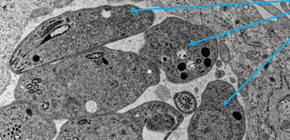
Immune response to parasite toxoplasma gondii drastically enhanced, a world first
Molecules which serve as brakes in immune response to toxoplasma identified
A group of researchers led by YAMAMOTO Masahiro , Professor, Osaka University's Research Institute for Microbial Diseases (also: Immunology Frontier Research Center), found that a host molecule, RabGDI, suppressed host immune reaction to pathogenic parasite toxoplasma gondii and that suppression of RabGDIα drastically enhanced immune reaction to toxoplasma.
Toxoplasma gondii are mainly transmitted to humans by eating undercooked meat infected with toxoplasm, causing fatal encephalosis and myocarditis in patients with immunodeficiency under the treatment of AIDS or anticancer drug treatment.
Toxoplasma gondii infections can cause complications in pregnant women, leading to miscarriage or birth defects, and the number of cases is on the rise in Japan. We, hosts, counter toxoplasma through interferon-gamma (IFN-γ)-dependent immune response; however, how the immunity response is suppressed had been unknown.
This group demonstrated that:
- 1. Removal of RabGDIα from the host drastically increased IFN-γ-dependent immune response that destroys toxoplasma, resulting in a decreased number of toxoplasma gondii.
- 2. Even in infection with toxoplasma with more gondii than usual, the survival rate of RabGDIα-deficient mice is high and the degree of fatal encephalosis is not serious.
- 3. The lipid-binding pocket (hole in protein) in RabGDIα is essential for its negative function.
This group's research results showed that suppression of RabGDIα function drastically increased immune function to toxoplasma and improved the serious conditions of Toxoplasma encephalopathy . Thus, new therapeutic strategies targeting the new molecule RabGDIα are highly anticipated for treating toxoplasma, whose case reports have been increasing in Japan in recent years.
Abstract
IFN-γ orchestrates cell-autonomous host defense against various intracellular vacuolar pathogens. IFN-γ–inducible GTPases, such as p47 immunity-related GTPases (IRGs) and p65 guanylate-binding proteins (GBPs), are recruited to pathogen-containing vacuoles, which is important for disruption of the vacuoles, culminating in the cell-autonomous clearance. Although the positive regulation for the proper recruitment of IRGs and GBPs to the vacuoles has been elucidated, the suppressive mechanism is unclear. Here, we show that Rab GDP dissociation inhibitor α (RabGDIα), originally identified as a Rab small GTPase inhibitor, is a negative regulator of IFN-γ–inducible GTPases in cell-autonomous immunity to the intracellular pathogen Toxoplasma gondii. Overexpression of RabGDIα, but not of RabGDIβ, impaired IFN-γ–dependent reduction of T. gondii numbers. Conversely, RabGDIα deletion in macrophages and fibroblasts enhanced the IFN-γ–induced clearance of T. gondii. Furthermore, upon a high dose of infection by T. gondii, RabGDIα-deficient mice exhibited a decreased parasite burden in the brain and increased resistance in the chronic phase than did control mice. Among members of IRGs and GBPs important for the parasite clearance, Irga6 and Gbp2 alone were more frequently recruited to T. gondii-forming parasitophorous vacuoles in RabGDIα-deficient cells. Notably, Gbp2 positively controlled Irga6 recruitment that was inhibited by direct and specific interactions of RabGDIα with Gbp2 through the lipid-binding pocket. Taken together, our results suggest that RabGDIα inhibits host defense against T. gondii by negatively regulating the Gbp2–Irga6 axis of IFN-γ–dependent cell-autonomous immunity.
To learn more about this research, please view the full research report entitled " RabGDIα is a negative regulator of interferon-γ–inducible GTPase-dependent cell-autonomous immunity to Toxoplasma gondii " at this page of the Proceedings of the National Academy of Science of the USA (PNAS) website.
Related link
